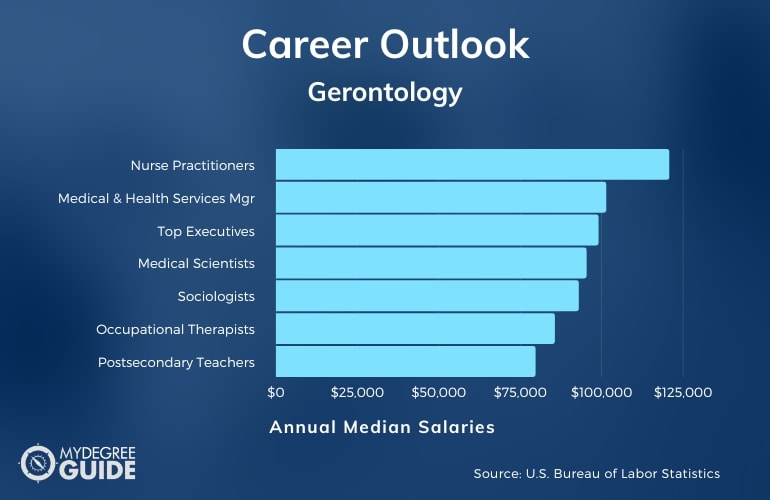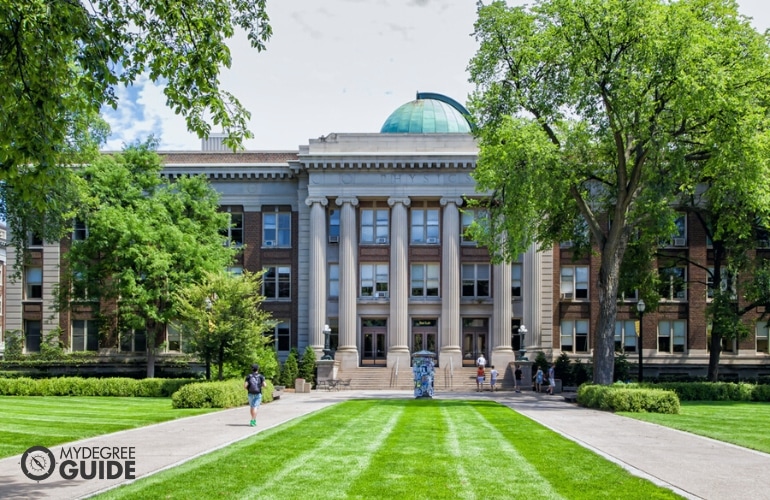If you are a motivated individual who wants to advance your education and research on how to improve the lives of elderly people, then a PhD in Gerontology may be for you.

Gerontology is a field of study that deals with the elderly and looks at the best strategies for improving their care and managing issues that may arise due to aging.
Editorial Listing ShortCode:
Students in gerontology PhD programs are at the cutting edge of study and research on the social, psychological, cultural, and biological aspects of aging.
Universities Offering Online PhD in Gerontology Degree Programs
Methodology: The following school list is in alphabetical order. To be included, a college or university must be regionally accredited and offer degree programs online or in a hybrid format.
Adelphi University
Adelphi University’s DNP in Adult Gerontology Primary Care program seeks to help students become nursing leaders. The program provides small class sizes and access to advanced technology. Part-time and online options provide flexibility for working professionals. Students in the program are required to complete an extensive clinical practicum to gain hands-on experience.
Adelphi is accredited by the Middle States Commission on Higher Education.
Baylor University
Baylor University offers a Doctor of Nursing Practice with an Adult-Gerontology Acute Care Nurse Practitioner track. Students can receive assistance in finding clinical placements. The curriculum consists of courses such as Diagnostic Reasoning, Gerontology Considerations for APRN Practice, and Adult Gerontology Acute Care NP Management I: Common Problems.
Baylor University is accredited by the Southern Association of Colleges and Schools Commission on Colleges.
Concordia University – Chicago
Concordia University—Chicago offers a PhD in Leadership with a specialization in Gerontology. The program is available online and on campus and is designed for working professionals. It requires the completion of 67 credit hours. CU Chicago is a Christian school that teaches from a Lutheran perspective.
Concordia University – Chicago is accredited by the Higher Learning Commission.
Franklin University
Franklin University offers a Doctor of Nursing Practice with an Adult Gerontology Primary Care Nurse Practitioner track that can typically be completed in 3 years. The program requires the completion of a practicum. The curriculum consists of courses such as Clinical Prevention and Health Care Outcomes, Diagnostic Methods for the Nurse Practitioner, and Management of the Geriatric Population.
Franklin University is accredited by the Higher Learning Commission.
George Washington University
George Washington University offers an online program for a Doctor of Nursing Practice in Adult-Gerontology Primary Care Nurse Practitioner. The program is open to those with a BSN or an MSN. Coursework is designed to be flexible for working nurses, but some courses do feature synchronous, live meetings.
George Washington University is accredited by the Middle States Commission on Higher Education.
Johns Hopkins University
Johns Hopkins University offers a DNP Adult-Gerontological Primary Care Nurse Practitioner program. Students can take courses online and come to campus for immersion experiences. The program culminates with a final project. The curriculum is designed to prepare students for ANCC and AANP certification exams.
Johns Hopkins University is accredited by the Middle States Commission on Higher Education.
University of Arizona
The University of Arizona offers a DNP with an Adult-Gerontology Acute Care Nurse Practitioner specialization. The program requires the completion of 30 credits and uses a hybrid model of online coursework combined with clinical placements and on-campus intensives. Students with a BSN or an MSN may apply.
The University of Arizona is accredited by the Higher Learning Commission.
University of Minnesota
The University of Minnesota offers an Adult Gerontological Primary Care Nurse Practitioner DNP. This full-time program is mostly online but does require some campus visits. It can typically be completed in 3 years. The program requires the completion of 77 credits, including a 1,000 hour clinical experience arranged by the school. The curriculum is designed to prepare students for national certification exams.
The University of Minnesota is accredited by the Higher Learning Commission.
University of Pittsburgh
The University of Pittsburgh has an MSN-to-DNP program with an Adult-Gerontology Primary Care Nurse Practitioner concentration. Students can choose between studying on campus or online and attending full-time or part-time. The curriculum consists of courses such as Applied Statistics for Evidence-Based Practice, The Science of Health Care Delivery, and Human Genetics and Clinical Applications.
The University of Pittsburgh is accredited by the Middle States Commission on Higher Education.
Walden University
Walden University offers a PhD in Human Services Studies with a specialization in Aging. There are two different tracks, depending on whether your highest level of education is currently a bachelor’s degree or a master’s degree. The curriculum consists of classes such as Human Services Theory, Introduction to Dimensions of Contemporary Aging, and Data as Evidence.
Walden is accredited by the Higher Learning Commission.
Online PhD in Gerontology Programs

PhD programs in gerontology study aging and how it relates to society, psychology, culture, and biology. Additionally, these programs look at the effects of public policy on aging. This means that as a student completing a PhD in Aging, you’ll be taking classes in a wide variety of fields, such as:
- Health
- Sociology
- Economics
- Psychology
- Anthropology
- Public policy
- Statistics
PhD programs often require you to complete original research in aging. So, you’ll likely take classes in qualitative and quantitative research methods as well.
After taking classes for the first couple of years, you might enter the dissertation phase of the program. During this time, you will complete a dissertation, which is independent and scholarly research that advances the field of gerontology.
Earning a PhD in Gerontology may open new doors in terms of careers. A PhD is a common qualification for teaching at the postsecondary level. Many PhD holders also turn to research positions, potentially working as medical scientists or sociologists.
Some choose to apply their acquired skills in the policy sphere, deciding to work for the government to shape policy toward the elderly. You may also choose to work with a non-profit institution, helping the elderly navigate the issues in their life.
Gerontology doctoral programs examine the process of aging and its effects on individuals, families, and communities. As such, some graduates choose to focus on the social services aspect of this field. Depending on your prior experience, a doctoral degree in this sector may help you qualify for positions in medical and health services management or social and community service management.
Gerontology Careers and Salaries

Earning a PhD in Gerontology may help you qualify for advanced careers in the field. According to the Bureau of Labor Statistics, here are the median salaries of some of the career paths related to gerontology studies.
| Careers | Annual Median Salaries |
| Nurse Practitioners | $120,680 |
| Medical and Health Services Managers | $101,340 |
| Top Executives | $98,980 |
| Medical Scientists | $95,310 |
| Sociologists | $92,910 |
| Occupational Therapists | $85,570 |
| Postsecondary Teachers | $79,640 |
| Social and Community Service Managers | $74,000 |
| Healthcare Social Workers | $60,840 |
| Health Education Specialists | $60,600 |
Many graduates pursue positions related to research or academia. Others work in healthcare, social services, and public policy. For instance, a nurse practitioner could benefit from doctoral study of gerontology to better understand and care for patients who are older.
Many positions related to gerontology have strong job growth numbers. For instance, the Bureau of Labor Statistics projects 13% job growth for healthcare occupations over the next ten years.
Doctor of Gerontology Curriculum & Courses

When it comes to earning a PhD in Gerontology, there’s a wide variety of courses you may be expected to take due to the breadth of the field.
Your coursework may include courses similar to the following:
- Physical Changes: In this course, you’ll learn about the physiological processes that happen when you age.
- Aging and Society: This course describes how aging is viewed socially and explores the social factors that affect aging.
- Aging and Economics: This course deals with the intersection of aging and the economy and how older workers contribute to economic production.
- Psychology of Aging: This course examines aging from a psychological perspective, looking at the psychological issues the elderly may experience.
- Aging Policy: This course describes how social policy is developed and its effects on older people through various perspectives, such as healthcare or income security.
- Research Methods: This course introduces you to the methodology of research in the field of gerontology.
- Statistical Methods: This course teaches you how to apply statistical methods of analysis to research gerontology.
- Long-Term Residential Care Management: Students taking this course learn about how long-term residential care facilities are organized and how to manage them.
- Aging and Human Resources: This course examines the meeting of aging and human resources management in organizations.
- Aging and Technology: This course describes the intersection between aging and technology and the problems the elderly may face with new technology.
In addition to coursework, you may be required to complete an internship or dissertation as part of your degree requirements.
Admissions Requirements

As part of the application process to gerontology doctorate programs, you’ll be required to submit certain items in order to be considered for admission. Failure to submit all required application materials may affect your chances of acceptance.
Typically, gerontology PhD programs will ask you to submit a couple of key application materials:
- Transcripts
- Statement of purpose
- GRE scores (only some schools require them)
- Letters of recommendation
- Resume or CV
It’s strategic to read your program’s website carefully to ensure you meet all the requirements for admission.
Accreditation

Enrolling in accelerated nursing programs online from a regionally accredited college or university can ensure that you’ll receive a high-quality education and that you’ll obtain a degree that’s widely recognized. Regional accreditation is a process by which a higher education institution passes thorough evaluations of their educational offerings and student services.
Earning a degree from a non-accredited school may adversely affect your chances of employment after completing the degree. Many doctorate programs only recognize course credits and degrees from accredited colleges and universities, such as an online masters in adult gerontology nurse practitioner or a graduate certificate in gerontology online.
Plus, many financial aid opportunities are only awarded to students at accredited schools. To find out if the universities you are applying to are accredited, you can visit the Council for Higher Education Accreditation’s website and search their database of accredited schools.
Financial Aid and Scholarships

To help students pay for their doctoral studies, the federal and state governments provide financial aid in the form of grants and loans to those who qualify.
To see what type of federal financial assistance may be available to you, you can visit the Federal Student Aid website and create an account. States have their own websites for aid. In addition to government aid, nonprofit and private organizations may offer scholarships that you can apply for. Your prospective school may offer scholarship, fellowship, or assistantship opportunities for doctoral students as well.
Many employers also run professional development programs for their employees in order to help them pay for the cost of further education.
What Can You Do with a PhD in Gerontology?

A PhD in Gerontology could open the door to a wide variety of careers due to an increasingly older and aging population.
Organizations of all stripes may need educated individuals to deal with critical situations involving the elderly. Earning a gerontology PhD could help you qualify for positions in research and academia. Some graduates pursue work as postsecondary teachers, health education specialists, medical scientists, and sociologists.
Others may pursue more senior or leadership positions in healthcare or social services. Medical and health services managers are in high demand, as are social and community service managers.
How Long Does It Take to Get a PhD in Gerontology Online?

Earning a PhD in Gerontology is a commitment in terms of time. Your life circumstances and the requirements of your program may dictate how long it takes you to complete your degree. Typically, earning a doctoral program requires 3 to 5 years of full-time study.
If no dissertation is required, then a doctorate can often be finished in 3 years if you follow a full-time study schedule. If your PhD program requires you to complete a dissertation as part of the degree requirements, then it may take closer to 4 or 5 years to complete. Part-time studies could also extend your time to completion.
What’s the Difference Between a Gerontologist vs. Geriatrician?
Though they sound similar and are related professions, there are many differences between what gerontologists do and what geriatricians do.
| Gerontologist | Geriatrician |
|
|
Geriatricians practice medicine, while gerontologists may work in a variety of fields and roles that deal with the aging population.
Is a Doctorate in Gerontology Worth It?

Yes, a doctorate in gerontology is worth it for many students. You might be interested in this educational path if you’re interested in identifying issues that affect the elderly and want to help find solutions.
Professionals with a gerontology PhD may choose to research issues in gerontology or try and create better social policy for the aging population. There is also a great need for gerontology professionals in healthcare, social services, and education. The Bureau of Labor Statistics projects 12% job growth for postsecondary teachers and 13% growth for healthcare occupations over the next ten years.
A doctoral degree in this field could also be well suited for those who carry out administrative and managerial duties in elderly care services.
Getting Your PhD in Gerontology Online

Many professionals with a PhD in Gerontology help the elderly achieve their best lives by researching and responding to the issues they face in modern society. This doctoral degree is applicable in diverse fields such as healthcare, education, research, social services, and policy creation.
You could take a wide variety of classes, exploring the diverse issues that elderly people face. A PhD program also tends to include a dissertation component, which would allow you to investigate a specific area of gerontology and participate in advancing the field.
You could start exploring accredited schools today to find the online gerontology PhD program that best fits your professional and educational goals.
